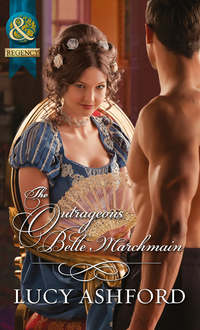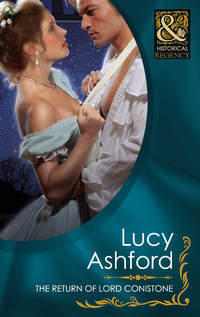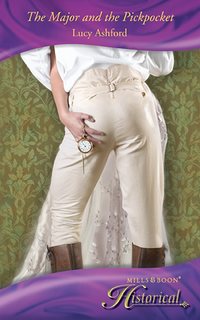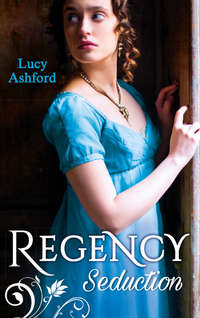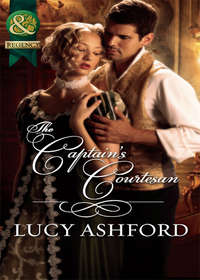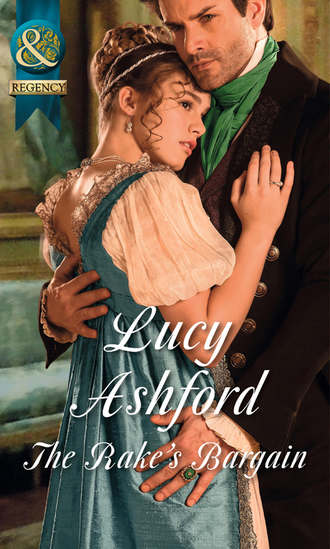
Полная версия
The Rake's Bargain
William Barry took any such event as an insult to his own skill and, after pulling the horses to a halt, jumped down to investigate. Beau quickly followed.
‘It’s not good,’ William pronounced, shaking his head. ‘Not good at all.’
He proceeded to nurse the vehicle as far as a blacksmith’s on the outskirts of Oxford, where the proprietor, Joe Hucksby, also examined the curricle with a deepening frown.
‘I’d say this axle needs a new cross-pinion, sir,’ he said to Beau, after scrambling up from beneath the vehicle. ‘And three hours is about the fastest time that my lads can do it. You see, with a top-notch vehicle such as this, everything has to be right and tight as can be, so maybe, sir, you’d like to go on into town and take a nice meal at one of the inns there? Especially since it’s starting to rain.’
‘I’m afraid I can’t wait. I have an appointment at Hardgate Hall this afternoon.’
‘You’re visiting Mr Palfreyman?’ Joe Hucksby looked surprised. ‘Well, if that isn’t the oddest thing! We just happen to have a fine riding horse of his stabled here. Mr Palfreyman left it yesterday to have it shoed, and—’
‘You’ve got Palfreyman’s horse here? Is it fit to ride?’
‘Why, yes, sir! In fact, Mr Palfreyman asked me to send one of my lads over to the Hall with it this very afternoon, as it happens.’
‘Then there’s no need to send one of your lads. I’ll ride his horse to Hardgate Hall myself.’
Joe Hucksby looked startled. ‘It’s a spirited beast, sir. Took two of my lads to hold it while I did the shoeing—’
‘I’ll take it,’ Beau repeated decisively. He was clad anyway in buckskins and riding boots and was impatient to get on with his journey. But he could see that William was fretting.
‘Should I see if there’s another horse, so I can come with you—sir?’ his coachman suggested quietly.
Beau shook his head. ‘Better if you stay around here, William, and check that the job’s being done properly. Oh, and you could take the opportunity to find a decent inn nearby. Book us two rooms for the night and get yourself a meal while you’re at it.’
‘But you, sir? You haven’t eaten since breakfast!’
‘Hugh Palfreyman’s bound to offer me refreshment of one kind or another. And, William—don’t tell them any more than you have to about me or my business at Hardgate Hall, you understand?’ He’d already instructed William to address him by nothing but sir for the whole of this journey.
As William nodded, Beau turned back to the blacksmith. ‘I’ll return for my coach later this evening, Hucksby. Here’s some payment in advance.’ He’d thrust his hand in his coat pocket and drew out some coins to put in the man’s big fist.
‘Well, that’s mighty obliging of you, Mr...’
‘My name’s Beaumaris.’
The blacksmith nodded, clearly disappointed that he wasn’t a lord at the very least. ‘Thank you kindly, Mr Beaumaris, sir. And I’ve no doubt that Mr Palfreyman would himself suggest that you take his horse if he were here, yes, indeed.’
Beau privately doubted it very much. But within ten minutes, the horse in question—a handsome bay gelding with a white blaze down its forehead—was saddled up and ready, though just as Beau was about to mount, the blacksmith darted away and returned with a sturdy whip.
‘You might be needing this, sir,’ Joe Hucksby pronounced. ‘Mr Palfreyman warned us this bay can be a stubborn brute and don’t like being told what to do.’
Already realising that the horse was trying to back away in pure terror at the sight of the whip—and that the blacksmith’s lads had gathered to watch the entertainment—Beau pushed the implement back into Joe Hucksby’s hands. ‘A man who needs to use a whip like that,’ he said flatly, ‘doesn’t deserve to be entrusted with any animal.’
William nodded his approval and Beau mounted, aware that the horse, on feeling his weight in the saddle, was already sidling and snorting with fear. Beau soothed the beast and thought, Damn. What has Palfreyman done to this animal?
He had a pretty good idea, for if he looked back at the horse’s flanks, he could see the marks where the whip had been used to lash the beast only recently. Palfreyman, he thought grimly, if my opinion of you wasn’t already at rock bottom, it certainly would be by now. He tensed his muscular thighs to let the gelding know that he was in control, while at the same time he stroked its neck. ‘There. There,’ he murmured. ‘Easy does it, now.’
The horse at last moved forward, showing obedience, even willingness. Beau was rather pleased to see the blacksmith and his boys gazing after him, open-mouthed. ‘Which is the best way to reach Hardgate Hall?’ Beau called to them over his shoulder.
‘The track through the Ashendale Forest is quickest, sir,’ one of the lads piped up. ‘You’d best take the road for Reading—you’ll see it just past the church. At the first crossroads you turn left, and then you want to head over the bridge and follow the path into the woods—’
At that point the blacksmith interrupted him. ‘Oh, I wouldn’t advise that way at all, Mr Beaumaris, I really wouldn’t. It’s easy to get lost and there are sometimes footpads.’
‘Is this track through the forest quicker than the turnpike road?’
‘Much quicker, sir.’ The lad was still eager. ‘It takes—oh, at least a mile off your journey!’
Then that’s the path I’ll take. And Beau was on his way.
* * *
The lad’s instructions were easy to follow and Beau was pleased to discover that the big bay, once he had its trust, was an energetic and speedy mount. He was even more pleased when he looped the reins over one hand and with the other delved for his pocket watch, to find that it was not yet half past three—there was still time to arrive punctually at Hardgate Hall. The one factor he hadn’t bargained on was the rain, which drove straight into his face and was becoming heavier by the minute, slowing his pace; but he never once thought of turning round, because this meeting with Palfreyman was long overdue. Palfreyman had questions to answer and consequences to face.
Beau’s frown deepened as he remembered the day of Simon’s funeral just two months ago, when the rain had fallen as relentlessly as it did today on the cortège of black funeral carriages and his brother’s oak coffin.
Enough of that wretch Palfreyman’s feeble excuses. It’s time to meet the coward face to face. Beau urged the bay gelding on through ancient oaks, aware that the trees were growing thicker all around him; but the path was clear enough and so he was taking little heed of the dank undergrowth on either side, which was foolish of him.
Because in his haste he had completely failed to see the two shadowy figures who had watched him earlier from behind a thicket of birch when he’d stopped to check the time. Failed now to see the twine tautly stretched between two saplings on either side of the path ahead of him—until it was too late.
One moment he was making good speed along the forest track. The next—disaster. The big bay stumbled badly and, though Beau wrestled to keep the beast upright, within moments he’d gone crashing to the ground.
Chapter Two
Loping steadily through the woods, Deb paused to brush down her kersey jacket and corduroy breeches, which had picked up a fine coating of pine needles when she’d landed on the other side of Palfreyman’s boundary wall just now.
On the safe side of Palfreyman’s boundary wall. She crammed her cap more securely over her curls and set off again towards the clearing where their horses were, weaving her way between the oak trees and the birch saplings, and even allowing herself a quick smile as she imagined Hugh Palfreyman’s face when he read that letter. When he saw the page she’d cut out.
She grinned, but she felt revulsion too. Ever since she’d got clear of that place, she’d been vigorously inhaling the fresh air to rid her lungs of the musty odours that lurked in Palfreyman’s secret room. And she found herself wondering again—why would her mother have even wanted to be reconciled with a brother whose cruelty had driven her from her home in the first place?
It wasn’t as if her mother had been unhappy with her new life. In fact, Deb remembered her as being full of love both for her daughter and for her husband, Gerald O’Hara, actor and manager of the Lambeth Players. Deb too had loved her caring and intelligent stepfather dearly; but two years ago had come a fresh blow, for Gerald had fallen prey to a debilitating lung sickness and had left the responsibility of the Players to her.
‘No. You can’t leave me in charge, Gerald. I’m too young!’ she’d pleaded as she’d crouched by his sickbed, feeling frightened and alone. Don’t die, she’d murmured under her breath to the man who’d truly been a father to her. Please. Don’t you leave me as well.
‘You can do it, my brave lass.’ Even though Gerald was desperately weak by then, he’d reached to clasp her hand tightly. ‘You’ve been holding the company together ever since my damned sickness started—don’t think I haven’t noticed how everybody comes to ask for your opinion. Ask Miss Deb, they say. She’ll know.’
‘But Francis Calladine—shouldn’t he be in charge? He’s the senior actor, and he used to perform at Drury Lane...’
‘And he never tires of telling everyone so.’ A wry smile lifted Gerald’s wan face. ‘No—Francis is a fine man for tragedy, but what the people want is entertainment, and you have an instinct for providing it. In addition, you can act every bit as well as any of those fancy ladies at Drury Lane.’
‘But to be in charge, Gerald. I couldn’t—’
‘One day,’ Gerald interrupted, ‘you’ll take London by storm, my lass. One day...’ He’d begun coughing again and Deb, distraught, had held a glass of water to his lips.
The Lambeth Players were no more than a humble travelling company. But Deb and Gerald dreamed of establishing themselves in London and a rich backer was the answer, Gerald had often told her; a rich and generous backer who would buy them a lease for one of the numerous small theatres on the edge of the city. ‘It needn’t be a fancy affair,’ Gerald said. ‘But think, Deb, of the plays we could put on, in our very own place!’
The rest of the actors were content with touring the usual theatrical circuits every year, setting up their stage at fairs and race meetings to entertain the crowds with their varied miscellany of comedies, songs and drama. Shakespeare was always a favourite of Gerald’s, but an ancient statute forbade minor theatrical companies like theirs to perform any Shakespeare play in full, so Gerald O’Hara had taught his players to pick out prime scenes only: Macbeth and the three witches, Henry V’s speech before the battle of Agincourt, and the balcony scene from Romeo and Juliet. By starting their shows with brief acts of comedy and acrobatics, Gerald was able to describe their performances as ‘entertainments’ and the crowds came in droves.
‘It’s like offering an all-too-brief taste of a banquet,’ Gerald had once said to Deb. ‘But some day, when we get that theatre of our own, we’ll perform the whole play—and we’ll have all of London society at our feet!’
But then Gerald died. Losing her mother at such a young age had been heartbreaking, but now Deb had to face life without her beloved stepfather, who had been her guide and her inspiration for as long as she could remember. Kneeling by his graveside the day after the funeral, she’d whispered aloud, ‘I can’t take charge of the Players, Gerald. I know it was your wish—but I’m only twenty and I’m too young. I can’t follow you. I simply cannot do it.’
She’d tried to explain as much to the others later that evening, when the Players had gathered in a tavern to solemnly discuss their plans now that Gerald was gone. It was Francis, loyal Francis, who’d raised a cheer for her and called out, ‘Who else but an O’Hara should be in charge of us all?’
And they wouldn’t take no for an answer. The Lambeth Players had given her their trust and in return she was prepared to risk everything for them—it was as simple as that. She’d been truly touched by the loyalty of Francis and Luke in coming with her today to Hardgate Hall, obeying her orders even though Francis clearly had grave doubts.
I’ve succeeded, she looked forward to telling him. I’ve succeeded.
She quickened her pace as she realised that the trees were beginning to thin out a little. There they were, Luke and Francis, standing in the clearing with their backs to her, engrossed in conversation, while a little distance away the old mare and the two ponies gently grazed...
Deb froze.
Beside them was a horse she’d never seen before. A fine big bay, with a white blaze down his forehead. A horse of quality. She felt her heart-rate falter; then she caught sight of something that really made her blood freeze in her veins. In the centre of the clearing lay the prone figure of a man. His wrists and booted legs were bound with cord, and a white silk neckerchief—his own?—had been used to blindfold him. He wasn’t moving.
Dear God, was he even breathing?
Deb turned slowly to her two companions, who had seen her now and were hurrying towards her. ‘Luke, Francis. What on earth...?’
‘We got him, Miss Deb!’ cried Luke jubilantly. And Francis was nodding towards their captive. ‘We had to act quickly. You see, he was galloping along the track, making straight for Hardgate Hall. And we knew we had to do something, Deborah, or you would have run into him.’
Deb looked at the bound, blindfolded man with a growing sense of—no other word for it—panic. ‘Who exactly do you think that man is?’ she breathed.
‘Why, he’s Hugh Palfreyman, of course!’ Luke delivered this news with an air of triumph.
Deb gazed down at their captive and found herself speechless again. The man was around thirty, she guessed: lean, fit and long-limbed. Even though he lay sprawled and unconscious in the mud she could see for herself that he was dressed like a gentleman, a rich gentleman, in a heavy cambric greatcoat, handcrafted leather boots and a lawn shirt with lace ruffles at his wrists. His hat had fallen off and he had black hair, gleaming and thick. As for his face...
She couldn’t see his eyes because of course he was blindfolded. But the rest of his features—his uncompromising jaw, his long nose, his firm mouth—were so downright arrogant that she felt her stomach lurch with renewed fear.
‘That man,’ she pronounced to Luke and Francis, ‘is not Hugh Palfreyman.’ Her every word was etched with a sincere and furious despair.
Luke’s jaw dropped in youthful dismay. ‘But he must be, Miss Deb.’
‘Why?’ she asked with deceptive calm.
‘Because he was on Palfreyman’s horse!’ explained Luke. ‘Do you see it?’ He pointed. ‘Francis and I were admiring it only this morning in Oxford. A blacksmith was shoeing it and it took two lads to hold the beast steady. One of them told us afterwards whose it was...’
His voice trailed away when he saw Deb’s expression. ‘And do you really, truly think, Luke, that there’s only one bay horse with a white blaze in all of Oxfordshire?’ Both of them stood silent; Deb pointed at the man wearily. ‘He is not Hugh Palfreyman. He’s nothing like Hugh Palfreyman. And anyway, what if he was? Since when have we been highway robbers? Why did you have to knock him out cold?’
Francis looked affronted. ‘We only wanted to stop his horse and perhaps delay him a little in case he met you. But he was going at such a pace, and so—and so...’
‘He fell off with an almighty crash, Miss Deb,’ supplied Luke.
Deb shuddered. ‘And then?’
Francis took over the tale. ‘And then we thought we’d better blindfold him and tie him up, of course. Because we couldn’t let him see us when he came round, could we?’
‘If he comes round,’ said Deb. How could they? How could they have done something so foolhardy?
Luke looked nervous now. ‘He’s still breathing and everything. We checked!’
Deb sank to her knees beside the prone man and ran her hands swiftly over his arms and shoulders.
As far as she could tell, he didn’t appear to be badly hurt. None of his limbs looked twisted or broken. There was no blood anywhere, and when she put her fingers to his wrist, his pulse was strong and even. But—oh, God, what would happen when he regained his senses and found himself trussed up tight as a turkey? And—who on earth was he?
Feeling even more flustered after touching him—goodness, he was big, he was powerful—she reached gingerly into his coat pocket, where she found a gold fob watch on a chain. She turned it carefully in her fingers. It looked old and very valuable, and on the back was a faded inscription. She held it up to catch the murky daylight and read the name aloud: Damian Beaumaris.
Whoever Damian Beaumaris might be, Deb knew with absolute certainty that they’d just made themselves a new and extremely dangerous enemy.
* * *
Beau was aware of aches and pains in every limb. His head hurt as if someone had swung a hammer at it. The last thing he remembered was riding through Ashendale Forest on Palfreyman’s horse, making good speed, until he’d spotted, too late, a length of cord stretched right across his path. And now he found that he was blindfolded, he was well and truly tied up, and he was lying on the cold, muddy ground.
Muttered voices drifted across the clearing, and the owners of those voices sounded mighty worried. So they should be. Beau’s jaw was tightly set. Then he frowned again, because some other faint memory lingered in his mind: a memory of the lightest of hands fluttering over his clothing, a finger touching his wrist. He thought he’d inhaled the delicate scent of lemons, and remembered a woman’s soft hair brush his cheek...
And he needed to pull his thoroughly scattered wits together this minute—because the voices were moving closer. He lay very still, assessing his predicament—bound, blindfolded and half-stunned—not good. His borrowed horse had been deliberately tripped up, and Beau had been thrown; but seconds before he fell, he’d glimpsed two men peering at him from the undergrowth—a middle-aged man in a scruffy red coat and black hat, and a callow fair-haired youth. It must be one of that pair of scoundrels—he guessed the older one—whom he heard now, muttering anxiously, ‘But that bay horse. We really thought it was Palfreyman’s, you see.’
That was interesting enough; but the next voice Beau heard set his senses into full alert. Because it belonged to a girl, and she sounded very, very anxious—with good reason, Beau reflected grimly. ‘Francis Calladine,’ she declared, ‘if I hear your excuses repeated once more, I swear I’ll tie you up with your own ropes. This man is not Palfreyman. His name is Damian Beaumaris. And what, in heaven’s name, are we to do with him?’
A case of mistaken identity, then—they’d thought he was Palfreyman, who it appeared was no friend of theirs. One thing was for certain—he was, at the moment, completely in their power. But Beau did not intend that particular circumstance to last for much longer.
He heard the voice of the older man again—he sounded just as worried as the girl. ‘Perhaps we should untie him and leave quickly, Deborah. When he comes round, he’ll just imagine he was thrown by accident. He won’t even know he was our prisoner.’
‘But what if he doesn’t come round?’ The girl again—Deborah. Beau envisaged his trio of captors scratching their heads. ‘What if he’s truly hurt, Francis?’ she went on. ‘What if we leave him here and—he doesn’t recover?’
In the silence that ensued, Beau found himself occupied by a thought that had been forming in his mind since the moment he heard the girl’s voice.
Most of the females who travelled with bands of highway robbers were as rough as their menfolk. But something wasn’t quite right about this one. She spoke well. She had an educated voice... He stirred as far as his bonds would allow, and let out a slight groan. Almost immediately, as he’d hoped, he heard the girl gasping, ‘Oh, no. Did you hear that? He is in pain!’ There was a rustle of clothes close to his ear, and once more he inhaled the faint lemon scent of soap and freshly washed hair as the girl bent down and placed her hand on his forehead; a cool, tender hand...
She’ll be ugly as sin, he warned himself. She was bound to be a painted, snaggle-toothed whore who had been bedded by the lot of them. Yet she spoke in a way that would be more at home in the drawing rooms of London than amongst a nest of vagabonds. He chided himself mentally. Whatever she was up to, no female was going to get the better of him. He lay very still, feigning unconsciousness once more.
‘We really should be off.’ The older man’s voice was taut with anxiety. ‘We could perhaps ride back to the nearest inn and mention that we glimpsed a stray horse in the forest. Then they would send someone out to investigate...’
‘We cannot leave him while he’s unconscious!’ The girl’s voice was authoritative. ‘This is my plan, Francis. I’m going to loosen our prisoner’s ropes and wait for him to regain his senses. As soon as he starts to do so, and we can be sure that he’s going to be all right, we’ll ride off as quickly as we can.’
‘But what if he gets on his horse and gallops after us?’ This was the younger lad speaking. ‘That bay of his could catch ours in no time!’
The girl had an answer for that as well. ‘We’ll lead his horse with us—just for a half a mile or so. Francis, can you go and see to the horses now? And, Luke, it’s really important that you remove every trace of our stay here—for example, the remains of that campfire you and Francis lit over there.’
Luke said suddenly, ‘I left some of my markers in case you had trouble finding us, Miss Deb.’
Deb frowned. ‘Markers?’
‘The sign for the Lambeth Players,’ explained Luke. ‘You know—the initials L and P, made with twigs. I made a trail, from the track to this clearing. I was only trying to help!’
‘You idiot, Luke,’ said Francis.
‘You’d better go and remove them,’ said Deb in exasperation. Luke and his games. ‘Every single one. And as soon as you’ve checked round everywhere, we’ll leave—but only when I’m sure this man is going to be all right, do you understand?’
* * *
They left, and Deb walked slowly towards their prisoner. Only now that Luke and Francis were out of sight did she feel that she could allow herself to give way to true, sick anxiety.
She dropped to her knees at the man’s side, noting that he lay as still as ever in his bonds apart from the rhythmic rise and fall of his broad chest—thank God he was still breathing steadily. She rapidly tried to summarise what she knew about him, which wasn’t a great deal, except that his name was Damian Beaumaris, and he was rich—she could tell that just at a glance, not only because of his fine attire and gold pocket watch, but because of that indefinable air of arrogance the rich had, yes, even when they were tied up on the ground and unconscious.
Luke and Francis had only been trying to help her, she reminded herself rather desperately. And they’d been right, in that if he had been Palfreyman, and had met her climbing back over his boundary wall, he would have seized her on the spot, found the books on her, and her plan would have been ruined. She could have been in dire trouble indeed...
And wasn’t she now?
Deb tried her best to control her panicking thoughts. At least Mr Beaumaris was alive, and had no idea who they were. And thank goodness there was no sign of blood. But she could see quite a lot else about him—a bit too much, unfortunately, for his expensive riding coat had fallen right back, and beneath his white shirt and buckskin breeches she couldn’t help but note that he displayed a formidably muscled body. Her eyes were reluctantly dragged again and again to that strong, square jaw already dark with stubble, and she found herself thinking that Peggy Daniels, the pretty actress who played most of the heroines for the Lambeth Players, would have been in raptures over him. ‘Now, there’s a fine figure of a man,’ she would have exclaimed.



